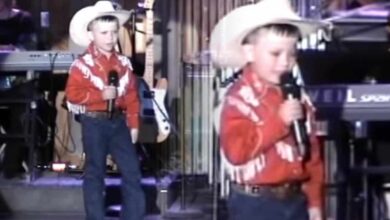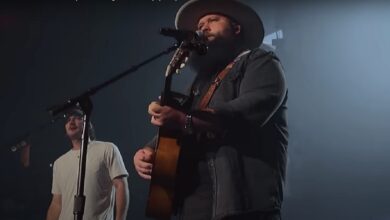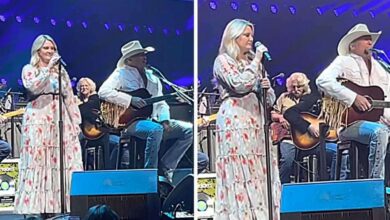Eddy Arnold And LeAnn Rimes Delivered A Remarkable Yodeling Battle In Their “Cattle Call” Performance
Cattle Call,” a quintessential classic in the country music genre, was first recorded by Eddy Arnold in 1944. This song stands out for its distinctive Western swing sound and its unique feature: the cowboy’s “cattle call” yodel. Arnold’s rendition of the song not only exemplified his smooth vocal style but also highlighted his exceptional yodeling technique, which became a hallmark of his musical identity. The song beautifully captures the essence of cowboy life, integrating elements of storytelling that resonate deeply with listeners.
Arnold’s version of “Cattle Call” quickly gained popularity, reaching the top of the Billboard Juke Box Folk Records chart in 1945. The song’s success was a testament to Arnold’s ability to blend traditional country elements with innovative touches. The compelling lyrics, which paint a vivid picture of a cowboy’s daily life and his interaction with his cattle, are delivered with Arnold’s signature charm and authenticity. This blend of poetic imagery and catchy melody contributed to the song’s broad appeal and helped secure its place in country music history.
The influence of Western swing is particularly evident in this piece, a style that became popular in the 1940s by integrating jazz and swing rhythms with country sounds. Eddy Arnold’s smooth vocal delivery, combined with the rhythmic yodeling, creates a soothing yet engaging auditory experience that encapsulates the cowboy experience. His unique ability to convey the deep connection between the cowboy and his herd through the song’s lyrics and melodies was a significant factor in its lasting resonance with audiences across generations.
Over the years, “Cattle Call” has been covered by numerous artists, each bringing their own interpretation to the classic tune. One of the most notable renditions came from Elvis Presley, who included a version of the song on his 1969 album “From Elvis in Memphis.” Presley’s cover introduced the song to a new generation of listeners, showcasing his own versatility as an artist while paying homage to the roots of country music. His notable yodeling in the song became a highlight, further enhancing the track’s appeal and contributing to the song’s sustained relevance.
The reach of “Cattle Call” extends far beyond its original recording. It has become a staple in the repertoire of country music, often performed live at various events and celebrated for its nostalgic value. Its catchy melody and heartfelt lyrics evoke cherished images of the American West, solidifying its place in the hearts of those who find solace in the romanticized ideal of cowboy life. This song captures a specific time and place in American culture, and its nostalgia continues to resonate with many audiences today.
Eddy Arnold’s impact on country music cannot be overstated, and “Cattle Call” stands as one of his most enduring contributions. Known affectionately as the “Tennessee Plowboy,” Arnold’s career was marked by numerous hits and a pioneering role in shaping the genre. His blend of smooth vocals, storytelling, and yodeling helped define the sound of mid-20th-century country music and influenced countless artists who followed in his footsteps.
To provide some context to Arnold’s extensive career, he was born in 1918 in Henderson, Tennessee. He began his career in the 1930s and became popular in the 1940s through his appearances on radio shows and his recordings. His musical style, which melded traditional country, pop sensibilities, and a touch of gospel, set the foundation for what became known as the “Nashville Sound.” This genre transformation led to broader mainstream acceptance and crossover success, paving the way for future generations of artists.
As the decades passed, “Cattle Call” also embraced recordings from various artists and different genres, solidifying its status as a classic. The song’s timeless appeal lies not only in its melody and lyrics but also in its ability to evoke a sense of belonging and nostalgia. It remains a reminder of simpler times, when the call of the cattle echoed across open fields and represented a way of life rooted in tradition.
The legacy of “Cattle Call” reflects not only the artistry of Eddy Arnold but also the cultural fascination with the archetypal cowboy. The song continues to inspire artists, songwriters, and fans alike, making it a beloved classic that bridges generational gaps. As country music evolves, songs like “Cattle Call” remind us of the genre’s rich history and its ability to capture profound emotions and experiences through relatable narratives.
Ultimately, “Cattle Call” is much more than just a song; it embodies a sense of identity and community within the country music genre. Its infectious melody and poignant storytelling reflect the enduring spirit of the cowboy lifestyle, inviting listeners to connect with their roots and appreciate the artistry that has shaped American music. The ongoing appreciation for Arnold’s work and songs like “Cattle Call” ensures that the spirit of country music remains alive and vibrant for future generations.





